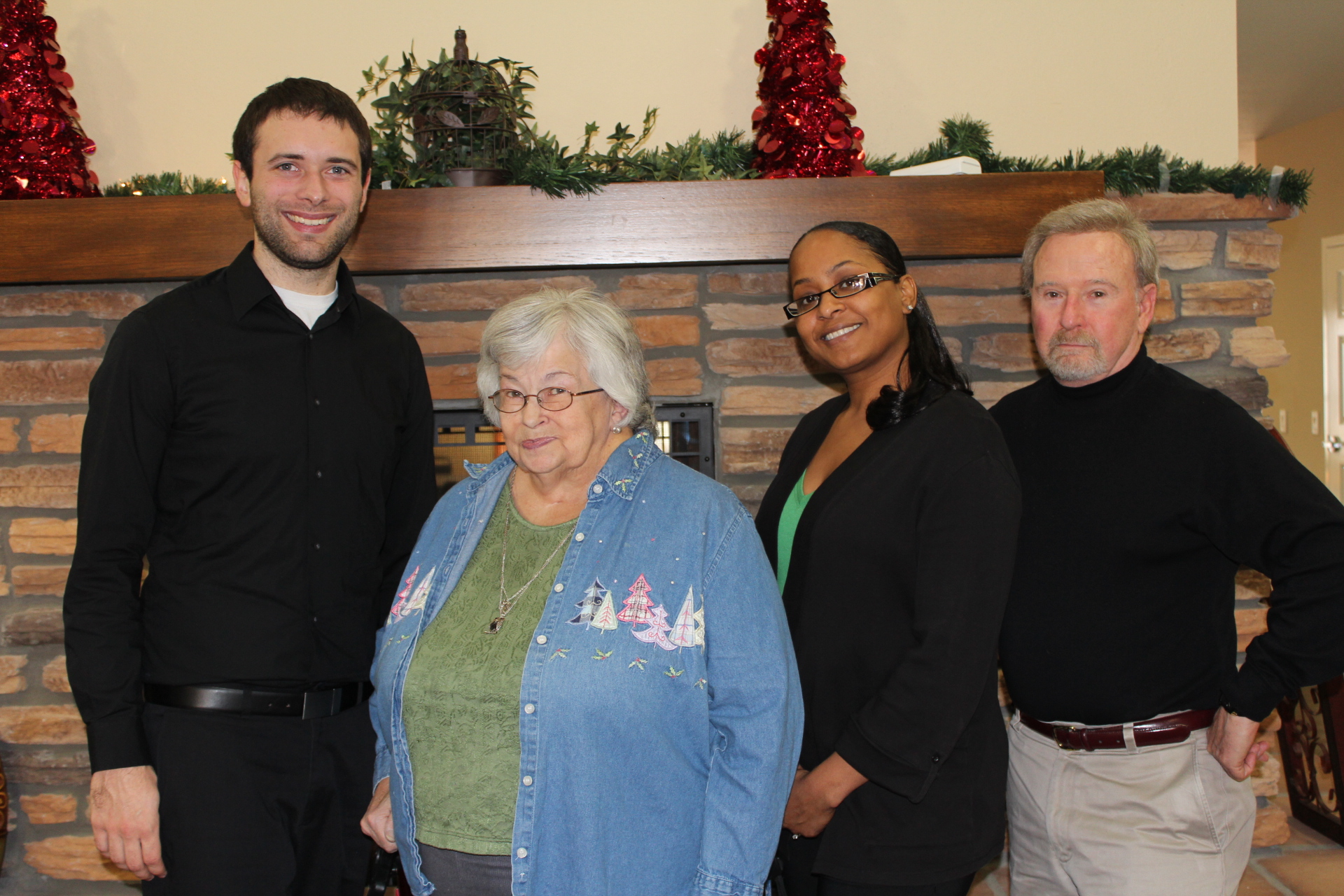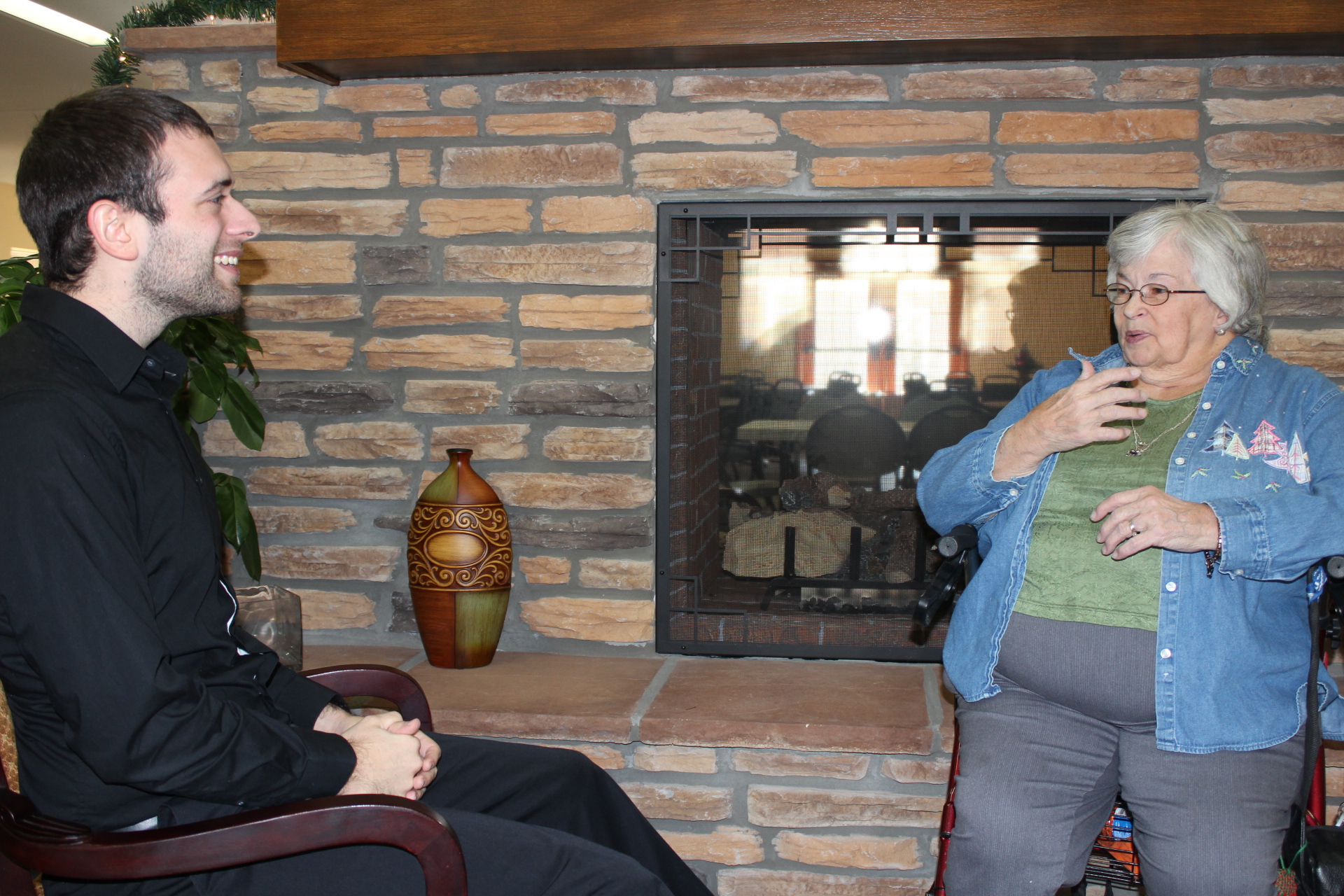Students spend semester serving, learning as interpreters for deaf elderly
Like others her age, Jackie Stover, 73, has made a good life at Good Shepherd, a sprawling, 145-acre retirement community tucked away on Aldersgate Road in west Little Rock.
Stover joined other retirees for Christmas festivities this week. On other days, she chooses to attend Bible studies and even plays a little bingo or a board game when the mood strikes her.
One thing Stover will not do is allow the fact that she is deaf to isolate her from other people or activities that can make retirement so enjoyable.

And, as she has done since arriving at Good Shepherd a couple years ago, Stover will rely on student volunteers from UALR to assist her in interacting with fellow retirees.
The interpreters provide a crucial link in keeping deaf residents informed about what is happening within their community, according to Katie Becker, an interpreter and coordinator in the UALR Disability Resource Center who has been involved in the outreach efforts at Good Shepherd from the beginning.
“She (Stover) gives them feedback on what they are doing correctly, as well as what can be improved upon … so that it ‘becomes a teaching moment,’” said Becker.
It is this kind of exposure to native American Sign Language (ASL) users that catapults the students to a skill level that is necessary to be proficient, according to Becker.
Proficiency is crucial, since UALR offers the only interpreting program in Arkansas and is one of only nine accredited four-year interpreting programs in the country.
More than 40 students have graduated with associate degrees and bachelor’s degrees from the interpreting program. Several of these students have volunteered to interpret for the elderly each semester since 2010.
But while training qualified interpreters is the ultimate goal, Becker said what she found most rewarding about the student volunteers at Good Shepherd is that they are doing something they want to do, not because it is required.
The activities at the retirement center provide the students an opportunity to improve their skills in a non-th reatening environment and, more importantly, provides quality time with the retirees.
reatening environment and, more importantly, provides quality time with the retirees.
“It is a great opportunity for the student to be of service, and the residents clearly enjoy it,” she added.
“She’s a very sweet lady. I love coming to chat with her,” acknowledged Wendell McIntosh, who is finishing his first semester at UALR and says he first met Stover at church.
McIntosh is one of five UALR students who interprets at Good Shepherd. The others are Niki Charles, Nick Winchell, Kris Miller, and Crystal Kirkland. A sixth student, Shelbie Heerboth, interprets for an elderly woman in Bryant.
Stover said qualified interpreters also help the deaf meet certain needs, such as when conducting business or in a medical emergency. But the ability to communicate provides something even more intangible — improved feelings of individual worth.
“I don’t want to have people do things for me,” Stover explained. “We (deaf persons) want to earn our own money, support our own families, drive our own cars, and pay our own insurance–just like everyone else.”
Stover said the world was much different for her and other deaf people in the mid-1970s.
Back then, Stover was a federal worker in Maryland who realized she and other deaf workers were at a significant disadvantage in advancing in their careers, primarily due to lack of access to qualified interpreters. She used the resources available at the National Association of the Deaf Law Center to advocate on her own behalf and others’.
The passage of the Americans with Disabilities Act, which requires that employers provide reasonable accommodations (including interpreters) for a known disability of an employee, has improved conditions for the deaf.
Today, schools such as UALR enroll several deaf students each year and provide interpreters at no charge so that the students may enjoy the same access to services and courses as hearing students.
That was not the case when Stover attended Gallaudet University, a federally chartered university for the deaf in Washington D.C. She graduated with a degree in library science in 1964 and later received a master’s degree in deaf education from West Maryland College.
Today, she is still providing an education to the students enrolled in the interpreting program by interacting with them on a weekly basis at UALR as they put their classroom skills into practice.
“It’s a wonderful part of our learning process,” said UALR senior Nick Winchell. “But it is really great to know that as we volunteer, we are also helping retirees stay involved.”
“I really appreciate their effort,” Stover said. “I wouldn’t be able to fully participate in activities around here without them.”